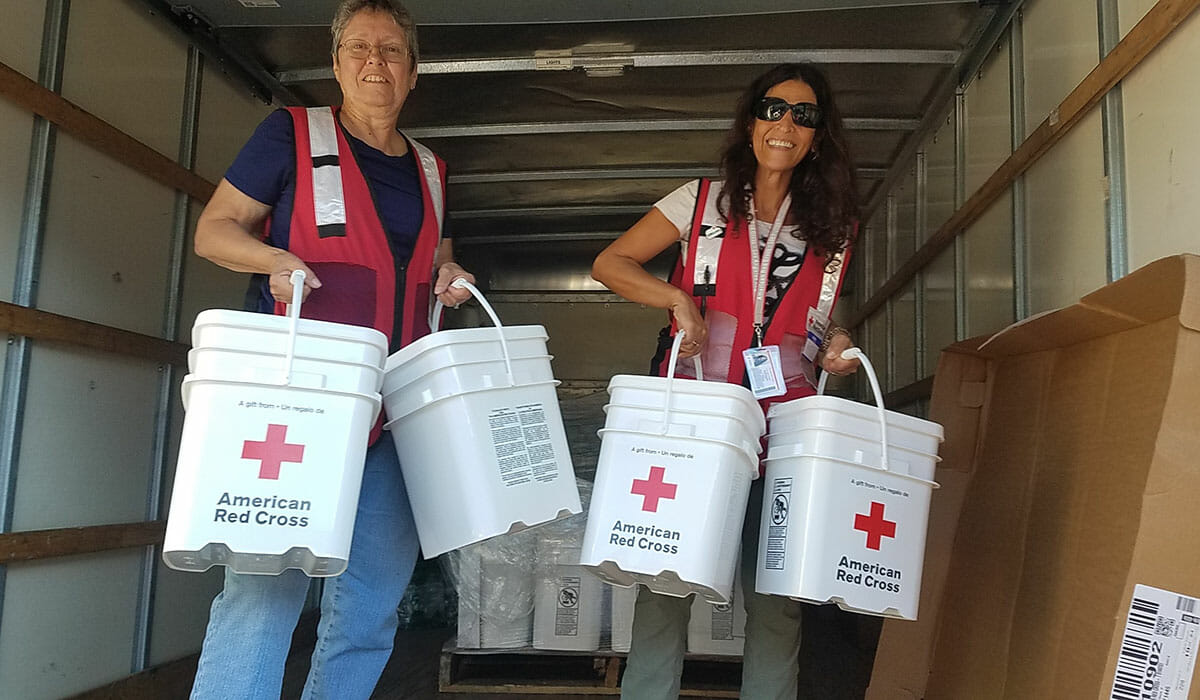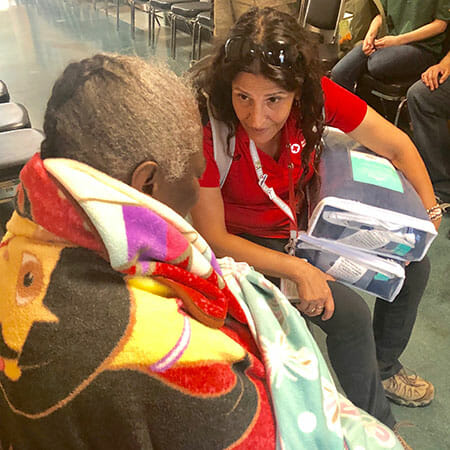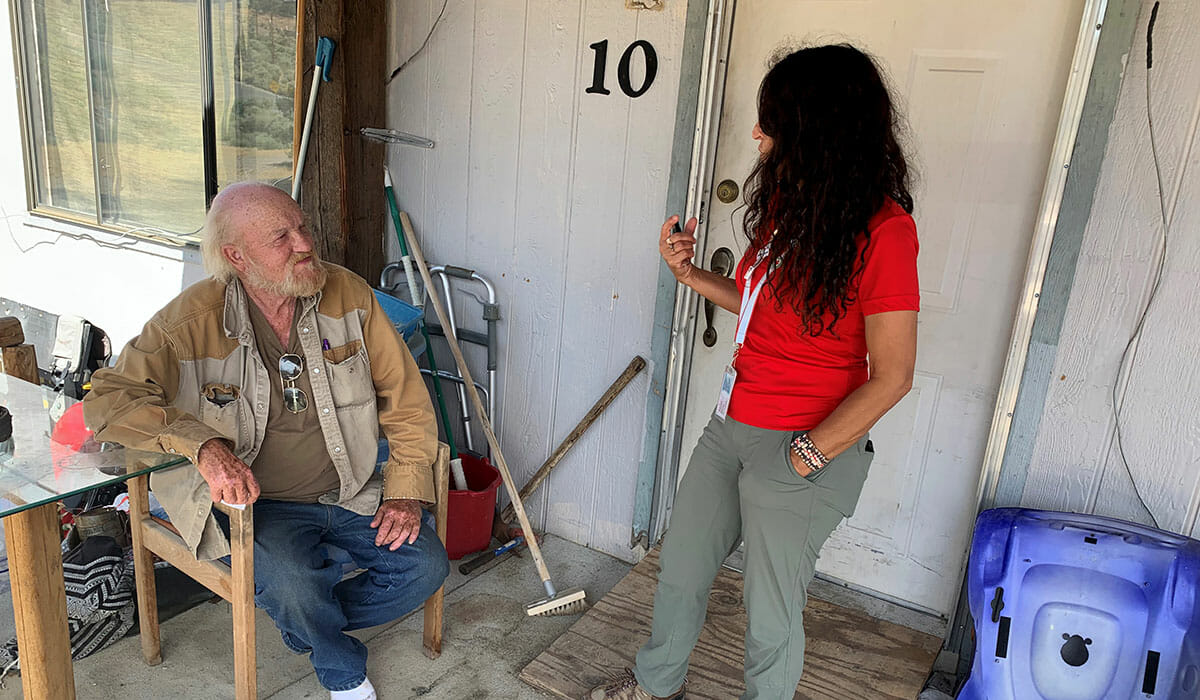Red Cross Volunteer Helps Those With Disabilities During Disasters

Meet Daily Point of Light Award honoree Anat Habani. Read her story and nominate an outstanding volunteer or family as a Daily Point of Light.
While watching Hurricane Harvey devastate parts of Texas and Louisiana in 2017, Anat Habani knew she wanted to do something to help. She immediately put in an application to the Red Cross and was soon deployed to Harvey-effected areas to distribute emergency supplies. Two years later, Anat not only continues to volunteer for the Red Cross, but has become their Lead Volunteer for Disability Integration in her Los Angeles region.
During natural disasters, Anat helps to assess physical shelters for accessibility for affected community members with physical, mental or cognitive disabilities, as well as coordinate any shelter modifications or items that may be needed, ranging from walkers or wheelchairs, to sensory kits or infant supplies. While she’s not out on disaster relief or preparing for future disasters, Anat is on the Disaster Action Team for her Los Angeles communities to support those whose homes have been affected by house fires or other accidents. She also volunteers for Sound the Alarm, a Red Cross campaign to install fire alarms in vulnerable communities and educate residents about fire safety. Between all that she does, Anat is volunteering for the Red Cross two to three times in a regular week, and during disasters is out on relief for two to three weeks at a time.
Describe your volunteer role with the Los Angeles Region of the American Red Cross.
Currently I am the Los Angeles Lead Volunteer for Disability Integration in the L.A. Region. The Red Cross is committed to the fact that everybody is welcome in their shelters. For that, we needed to have disability integration — integrating everybody, providing everybody with the ability to be in a shelter and to actually have access ability to all the services physically, mentally, everything. If you are in a wheelchair, if you have a walker, if you are elderly, you have everything you need physically. If your English is second language, if you’re pregnant, if you’re an infant, if you’re homeless, if you are cognitive and mentally disabled, deaf people, blind people, everybody, we want for them when they come into our shelter to be able to access everything. So this is what we are preparing in blue sky [Red Cross term for when a natural disaster is not occurring] to provide, and when I go out on disaster relief throughout the United States that’s what I’m striving for.

What do you do when you go out on disaster relief?
When I get there, my specific task is to actually assess the physical shelters for accessibility and if they are not, we do our best to modify what we need to make sure people feel comfortable. If I need to modify a ramp or make sure we have accessible showers, accessible bathrooms, offer phone, signage, interpreter if necessary for languages. We establish all that in anticipation of people coming in from all walks of life, and being able to understand and access everything. We start with the physical place. If I need a modification, I do it through Red Cross or [through the] counties. Every state has a different way they do things. If necessary, I recommend a different place to be if there is [another place available]. Sometimes in disaster areas, we have what we have. If something is isolated and we have only this place to house, then we do everything we can to modify to make sure everybody has equal accessibility for everything. If I need to get walkers to help, if they have it, I go to our partners and ask for a donation. If we need a shower chair, if we need to buy head shower to modify for somebody who is sitting can use the shower.
This is the physical sense of the things. We also provide kids and adults on the spectrum with sensory kits to calm down. I create a quiet room if I can in the shelter, to have people who are anxious to have a place to just come down and cool down. … A sensory kit is a weighted blanket that helps you feel more protected. It’s comfortable, it reduces anxiety. It helps a lot for adults and kids who are on the spectrum, and people who suffer from panic and anxiety. When you’re in a shelter, you can be among 100 people. When you go into a disaster, it’s pretty chaotic, because you can imagine, people are not in their home, not in their comfort. Also in the sensory kit, there’s the weighted blanket and we provide headphones and a squeeze-ball.
We make sure that there is no separation in our shelter between any kind of population. It’s inclusion, integration of everything. We do provide special medical cots when necessary for people that need more support. I do make sure when I get to the disaster area, that I know my partners, what they can provide, what they can do to help, and my state government zone, what they can help us with and provide, just to make everything easier for everybody and better accessibility. We have a contract with a video phone [company] that we can provide for deaf people, we have good signage for languages. It’s a lot of work and every disaster is really different, so it requires from me different things in every different state, county, everywhere, because the population is different. I can help with providing transportation so our client will be able to go to doctor appointments or anything that they need. It’s a big effort on top of everybody and I’m just there to coordinate it and help, because we do have mental health and we have nursing [specific Red Cross volunteers], so those are different things but we are all cooperating, coordinating, communicating with each other.
Can you describe what you do for Red Cross when you’re not out on disaster relief?
Sound the Alarm, we do it in our communities all over the L.A. region and the Red Cross does that everywhere. It turns out more people die in house fires than every other disaster. The Red Cross is working on making sure that we as volunteers donate the smoke alarm and we educate about how to exit a fire. We go through a community and knock on doors sometimes, or sometimes there’s a meeting, and say ‘Hey, we are Red Cross volunteers, it’s for free, we can install it if you like.’ We go to vulnerable neighborhoods and make sure that’s what we do and everybody has a safer home. I do volunteer when I’m able and I can, usually on the weekend and sometimes they ask me to do it during the week if I have time.
The Disaster Action Team is where everybody can go in and take those courses that are necessary and then we are volunteers. We put ourselves into a 12-hour shift, and if there is a disaster they call us and we get ready and we go out. Sometimes they just call me because they know if I have time I can go even if I don’t have that shift, per se. We go as a team. We assess the ability to live in that house. We get a call usually from the fire department for the team to come in. The last one I did was I think about ten minutes away. It was a house with a mother and four children. A fire caught up in the attic and we came in, we provided them with blankets, with snacks, with water. Then we see if there is no insurance and if they need, we provide them with money for a hotel and livable expenses. We do help them for at least the first, second night, to get themselves into someplace before insurance kicks in, relatives. We offer our ability to listen, and if a warm word and a hug is necessary, we’re there. Sometimes it’s necessary to open a shelter because it’s 80 residents in one apartment, so we do open shelter. We get people to do the sheltering and make sure people get to the shelter and have what is necessary until they can actually access their apartment or if not, until the homeowner is able to continue to provide them with a place to be. Those are the main things. If there is a need in the warehouse, if we need to open a trailer and just go through that, clean cots and do things, that’s what we do.
How did you first get involved with volunteering for Red Cross?
[2017 Hurricane] Harvey. I was sitting at home, I was just done with my work for the night, I was tired from working, and I saw Harvey. I always wanted to be a volunteer. When I saw that, right away I put in an application. I was able to deploy to Harvey for distribution of emergency supplies. We drove through the community providing necessary supplies in Harvey. It was a great experience to be able to be there in the community, and see how we were able to provide the necessary items, and the relief on people’s faces when they saw us around. It was a different kind of experience, that disaster relief. That’s what started [volunteering.] I did sheltering, and in [2017 wildfires] Thomas Fire, I did shelter and I worked logistic warehouse, a lot of other roles. Right now I’m concentrating on disability integration.

Why is disability integration important to you?
I went through a serious earthquake here in ’94 where I live. I’m always thinking about the fact that even myself … My vision is not the best, so just imagine me getting to a shelter without my glasses, my contacts. In a chaotic situation, you would run out and you might not be able to get to your home to get all these things … I’m a lot more sensitive and I am a social worker at trade, so I’ve been working with the population of elderly and disabled for 15 years before [volunteering], and it’s something very close to my heart. I know the limitations and I know how difficult it is on a daily basis. Just imagine being in a disaster. Some of them are out of their house without their walker, without their wheelchair, without any assistive device. It is very difficult to watch people go through disaster, and I strive to make sure when they come in that we are able to support them.
What’s been the most rewarding part of your work with the Red Cross?
I think being in contact with clients and being able to see some relief on their face when you’re in contact with them, providing what they need. Just being there to listen sometimes. … For me, the rewarding thing is just seeing people, being able to alleviate some of their suffering. That’s what counts for me. Trying to give them a feeling of home away from home, whatever it is, because I know from when I went through a disaster how important it is to have that support. This is what’s important for me. I’m not going to be able to rebuild their home, but alleviating their suffering in the moment.
What have you learned through your experiences as a volunteer?
It’s a whole different ball game of working in a natural disaster. I live in my neighborhood and you never know when your neighbor experiences a fire. I also do what we call Disaster Action Team when I’m not on a disaster [call]. We provide to our region in case of fire or any disaster that happens to any of our neighborhoods. The scope of the Red Cross, I’ve got to tell you I was surprised myself, because when you live life and you work day in and day out, you hear about things but you’re not in tune. Like, ‘Oh, ok, their house is burned.’ Not even just the big disasters, I’ve already went through ten of them in the state with disability integration. The day-to-day when I’m called in for a disaster call for somebody whose house is burned, somebody who had a truck just went in and destroyed two apartments and forced the rest of the residents out of their home. I just think about how life can change in a moment and how much help we have.
The one thing I was impressed by — my first deployment in Harvey, when we were sitting there waiting for our assignment, I looked around me and I asked ‘Where are you from, where are you from?’ [I was] not just impressed, but so proud to see people were there from all over the United States. All walks of life, all ages, coming in ready to help. You live in Los Angeles, a big city, you live your life, you hear about the Red Cross but you don’t understand the scope. Seeing the spirit of the people coming together to help, it’s just something that gave me a lot of hope in life. It’s just amazing.
I learned a lot about how to work and cooperate and understand. Every time I go into disaster, it’s a different state, different population. My ability to learn more about every place and how to be able to help or be there for them, it gives you a lot more flexibility in life. Understanding really the suffering of other people, no matter what age, what culture, where they came from, how much money they have, what socioeconomic status they are. When you have a disaster, it’s so humbling just to witness that. There’s so much in the past two years that I’ve been exposed to and so grateful to learn. Even things about myself. It’s a great life experience.
What would you want people to learn from your story?
I want people to be kind to each other, especially when there is a disaster. People need to know that volunteering is something that is important to our society and hopefully a lot more people will be able. It doesn’t matter where, you can volunteer anywhere. You can volunteer an hour a week, you can volunteer a day a month, a half a day a month. Not just with the Red Cross, everywhere. Apathy is the worst enemy and I think by volunteering, you are somebody who cares, who gets involved as much as you can. Everybody can do their share. There is so much need out there and I think sometimes people, they don’t know. You can go anywhere, you can volunteer with animals, anyway you want, you can work with children, you can volunteer with adults. Even within the Red Cross, there is so much to do. You don’t have to be in disaster relief in order for you to volunteer. I think for us as a community and young people, I would love them to know that volunteering somewhere will enrich your life and you will actually feel a part of the community. Because we are a community. Without it, we are pretty much detached. So I’m hoping that a lot more young people will do that. It doesn’t have to be in the scope that I’m doing, it can be little things.
Do you want to make a difference in your community like Anat? Find local volunteer opportunities.
